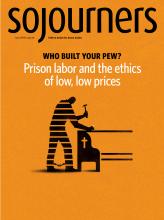MONEY IS TO Americans what sex was to Victorian England. We’ll read about others’ exploits, but rarely reveal our own.
In the mid-1980s, I joined the Sojourners base Christian community. I was in my 20s with little disposable cash and a modest college loan. My theological attitude was “love of money is the root of all evil” (1 Timothy 6:10)—even thinking about money risked sliding into America’s amorous relationship with capital.
Read the Full Article

Already a subscriber? Login
